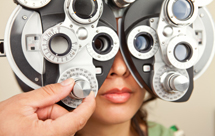Our Services
Routine Eye Examinations
 Regular eye exams are an important tool in eye health by detecting and preventing eye diseases and evaluating the overall health of the patient. Some diseases, such as glaucoma, develop gradually without symptoms of pain or vision loss, so patients may not notice that anything is wrong until significant and irreversible damage has been done. Early detection of eye diseases allows for a choice of treatment options and a reduced risk of permanent damage.
Regular eye exams are an important tool in eye health by detecting and preventing eye diseases and evaluating the overall health of the patient. Some diseases, such as glaucoma, develop gradually without symptoms of pain or vision loss, so patients may not notice that anything is wrong until significant and irreversible damage has been done. Early detection of eye diseases allows for a choice of treatment options and a reduced risk of permanent damage.
Patients should see their doctor for a comprehensive eye exam every year. Children should have regular tests to ensure the proper development of their vision and prevent any interference with academic achievements. Older adults are often at a higher risk for eye conditions such as glaucoma, macular degeneration and cataracts. Even if eyes are healthy, a regular eye exam will provide the doctor with an ability to view the blood vessels of the eye. With information obtained during an examination of the eyes, physicians have been able to detect chronic conditions such as high cholesterol, diabetes and high blood pressure. The early detection of these conditions can lead to early treatment.
Dry Eye Treatment
Dry eye is a common condition that occurs when the eyes are insufficiently moisturized, leading to itching, redness and pain from dry spots on the surface of the eye. The eyes may become dry and irritated because the tear ducts don't produce enough tears, or because of a chemical imbalance in the tears.
Patients with this condition often experience irritating symptoms and which may result in more serious damage to the vision if the condition is left untreated. It is important for patients with this condition to take special care of their eyes in order to alleviate symptoms and prevent complications. Your doctor can diagnose dry eye after a thorough evaluation of your eyes and tear production with a Schirmer tear test.
Macular Degeneration
 Macular degeneration affects the macula, the part of the retina responsible for the crisp, detailed central vision needed for reading or driving. Macular degeneration occurs when the center of the retina degrades, causing a progressive loss of vision. Symptoms include:
Macular degeneration affects the macula, the part of the retina responsible for the crisp, detailed central vision needed for reading or driving. Macular degeneration occurs when the center of the retina degrades, causing a progressive loss of vision. Symptoms include:
- A gradual loss of ability to see objects clearly
- A gradual loss of color vision
- Distorted or blurry vision
- A dark or empty area appearing in the center of vision
- Wavy lines in the vision
There are two kinds of macular degeneration: "wet" and "dry." Regular eye exams are highly recommended to detect macular degeneration early and prevent permanent vision loss.
Diabetic Eye Examinations
Patients with diabetes are at an increased risk of developing eye diseases that can lead to vision loss and blindness, such as diabetic retinopathy, cataracts and glaucoma. In fact, diabetic retinopathy is the leading cause of blindness in the United States.
Diabetic eye conditions often develop without any noticeable vision loss or pain, so significant damage may already occurred to the eye by the time patients notice any symptoms. For this reason, it is important for diabetic patients to have their eyes examined at least once a year. Early detection of eye disease can help prevent permanent damage.
Diabetic-related eye problems develop from high blood sugar levels, which can cause damage to blood vessels in the eye. More than 40 percent of patients with diabetes will develop some form of eye disease in their lifetime. The risk of developing eye problems can be reduced through regular eye exams and by keeping blood sugar levels under control through a healthy diet and regular exercise.
Glaucoma Laser Treatment
Glaucoma is an eye disease in which pressure inside the eye, also known as intraocular pressure, rises to a level that causes damage to the optic nerve causing vision loss or blindness. Clear eye fluid is produced by the ciliary body which enters the eye and drains out of the eye through tiny passages known as the trabecular meshwork. People with glaucoma are unable to drain the fluid effectively which results in a rise of intraocular pressure.
Some cases of glaucoma can be treated with medications. Other cases require either laser or traditional surgery to lower eye pressure. Of the two types of surgery, laser surgery is the most frequently used procedure in the treatment of glaucoma. Conventional surgery is usually performed after all other treatment methods for glaucoma, including laser surgery, have proven unsuccessful. In deciding what method of surgery to treat glaucoma, your surgeon will take into consideration your medical health and history, and the severity of your condition.
Contact Lenses
 Over 35 million Americans wear contact lenses, according to the American Optometric Association. Unlike glasses, contact lenses move with your eyes so you can enjoy a larger field of vision with fewer distortions. You also don't have to deal with frames hovering in your peripheral vision or external lenses that fog up on cold days or get wet in the rain.
Over 35 million Americans wear contact lenses, according to the American Optometric Association. Unlike glasses, contact lenses move with your eyes so you can enjoy a larger field of vision with fewer distortions. You also don't have to deal with frames hovering in your peripheral vision or external lenses that fog up on cold days or get wet in the rain.
There are many different kinds of contacts, including:
- Rigid gas permeable
- Extended wear
- Disposable wear
- Daily-wear
- Bifocal or multifocal
After a thorough eye exam and consultation with an experienced physician, patients who qualify for contact lenses can discuss which type of contact lense is right for them. All contact lenses require special care and cleaning. You'll need to make regular follow-up visits to ensure your eyes remain healthy.
![]() For more information about our Our Services or to schedule an appointment, contact our Peoria, Scottsdale, or Wickenburg office.
For more information about our Our Services or to schedule an appointment, contact our Peoria, Scottsdale, or Wickenburg office.





